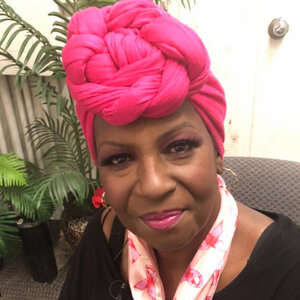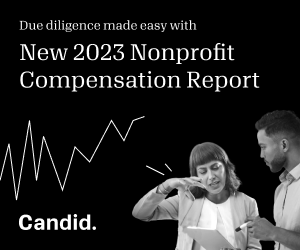How to power shift in philanthropy: Lessons from The Share Fund’s radical approach to participatory grantmaking

How can wealthy people change the trajectory of philanthropy—and, ultimately, help solve society’s biggest problems? The answer lies in how a funder does grantmaking.
In 2021, I joined a group of five BIPOC (Black, Indigenous, and people of color) leaders to guide the grantmaking efforts of The Share Fund. The fund was established by Bill and Holly Marklyn, a Seattle-based couple who made the decision to redistribute all of their wealth in their lifetimes. As a member of the inaugural Funding Committee, I have seen firsthand the impact that centering community—and decentering donors—can have on making radical shifts in philanthropy.
Black-led organizations receive less funding than white-led organizations. According to a 2020 study from Echoing Green and The Bridgespan Group, the unrestricted net assets of Black-led nonprofits were 76 percent smaller than those of their white-led counterparts. If grantmaking is a proxy for trust, then this statistic points to the overwhelming lack of trust in Black leaders. It’s time to put resources into the hands of those closest to the problems philanthropists want to address.
The Share Fund’s approach to grantmaking is radical in that the funders have completely given up control to the Funding Committee members. Our community connections and expertise in racial and gender justice guide The Share Fund’s grantmaking. Over the past three years, we have moved $1.1 million to organizations that work to advance climate and gender justice, remove cultural barriers so that women of color can attend law school, and protect Indigenous cultures, as well as a range of other issue areas.
The Share Fund proves that centering community and decentering donors can help create a more just and equitable society. The Fund recently published a report, Letting Go of Power, Centering Community, summarizing our collective learnings, progress, and challenges. Here are my insights from this experience:
Donor-decentralized philanthropy requires prioritizing community members’ networks, knowledge, and experience over the decisions of wealthy donors.
True impact requires relinquishing control and trusting those closest to the issues to make informed decisions. Bill and Holly are not in the room when discussions about grantmaking happen. Their few requirements are that grantees must be led by BIPOC folks and focused on furthering racial and gender justice in Washington State. Other than that, it’s up to us.
The Share Fund also recognizes that no one can single-handedly solve complex societal problems; it takes a collective. Our Funding Committee includes individuals with a wide breadth of experiences, including scholars, artists, community organizers, and nonprofit leaders.
Philanthropists, at every level, can rise to meet the needs of community.
Giving up control can be scary and uncomfortable for many families, especially for multi-generational or larger families. The Share Fund is proof that this type of grantmaking is rewarding. Because we eliminated formal application processes for perspective grantees, the Funding Committee conducts our own research and due diligence without requesting burdensome details from grantees—adding to their astonishment when they receive the news on a Friday. During our “Feel Good Friday” calls, I have heard the disbelief and shock in an executive director’s voice when they learned about this grant. Often, there are tears because they finally feel seen for their work.
The Share Fund offers a model for foundations with small teams and even no formal staff. Bill and Holly partnered with Phīla Engaged Giving, a Black woman-led philanthropic advisory firm, to conceptualize and realize The Share Fund. Phīla Engaged Giving continues to manage all administrative aspects of this effort, including holding our Funding Committee meetings and distributing funds to selected grantees. An outside facilitator moderates our monthly discussions, ensuring that all opinions are heard.
Funders should be open to adjusting and addressing challenges as they arise.
The Share Fund is evolving, and we don’t always get things right. For example, in our early days, the Funding Committee members had many administrative tasks that distracted us from grantmaking. Being overburdened is a common problem for BIPOC leaders, and we wanted to change that paradigm. After discussions with Bill and Holly, administrative responsibilities were shifted to Phīla Engaged Giving. The founders’ willingness to listen has enabled The Share Fund to focus on centering equity in its processes.
By listening to our insights, Bill and Holly have supported The Share Fund as we imagine new ways of doing business. For example, traditional conflict of interest policies are rooted in a colonial construct that does not account for the overlapping roles and relationships that many BIPOC leaders have in our communities. We collaborated on a new document that better suited our reality. “The Community Trust and Transparency Policy” is rooted in honesty and openness, a central theme to this type of extreme participatory grantmaking. Those interested in this document can find it on page 53 of the report.
Foundations of all shapes and sizes can take inspiration from The Share Fund. Centering community in grantmaking takes courage, intention, and ongoing focus. But the rewards—in terms of positive impact on people’s lives and long-term power shifts in philanthropy—are tremendous. It’s time for more philanthropists to experiment with grantmaking that isn’t all about them.
Bridgette Hempstead is founder and CEO of Cierra Sisters, Inc., a breast cancer survivor and support organization for African American women that provides education and advocacy about women’s breast and health issues.






